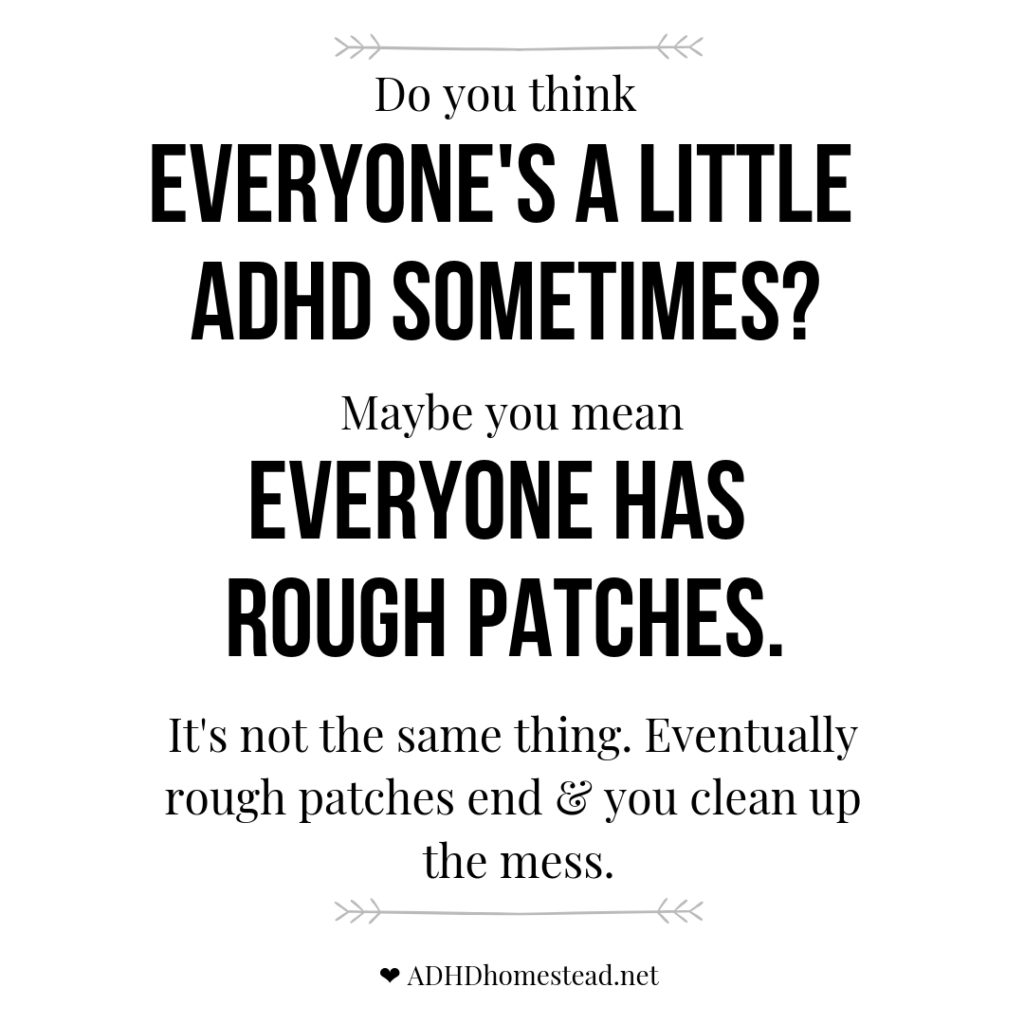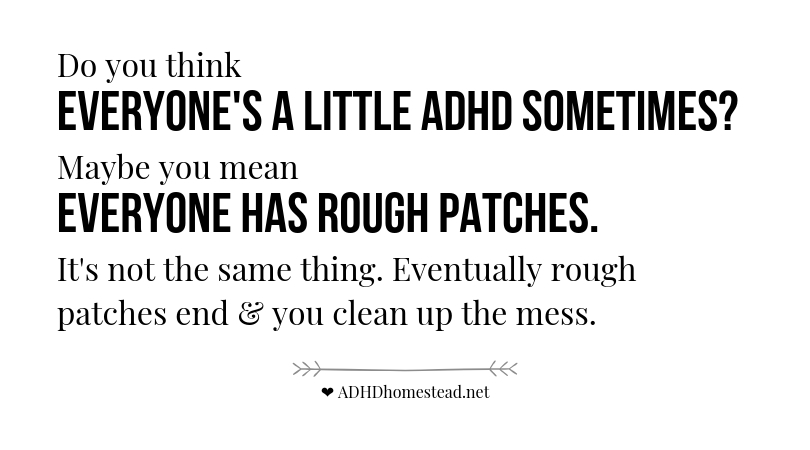This post is adapted from an excerpt of my book Order from Chaos.
Most of us with ADHD have heard the refrain, “but this happens to everyone. You just have to power through it.” Nobody loves paying bills or doing housework. Everybody feels scattered sometimes. Why should some people get to use ADHD as an excuse, while the rest of the world just has to suck it up?
It can be hard to answer this question. There’s a grain of truth in it. Under enough stress, even the most put-together person can develop ADHD-like symptoms. ADHD traits are, at the end of the day, magnified human traits.
The key difference between “it happens to everyone” and “it’s ADHD” is context. For someone without ADHD, the struggle is caused by something external, like a big deadline or a family crisis. True ADHD emerges in childhood, usually by early elementary school. It also impairs us in multiple roles (e.g., both at home and at work/school). It sticks around, no matter how we change our environment or our diet.
This isn’t an excuse. People with ADHD can bring our symptoms under control with medication, adequate self-care, and other coping strategies. And we should, if we want to lead fulfilling lives and maintain healthy relationships.

Doesn’t medication fix ADHD?
Some people believe stimulant medication does the hard work for us, or even gives us a leg up. Sorry, but no. There’s a difference between making something easy and making it possible. Medication gives us a choice we previously lacked. It allows us to begin the hard work in the first place.
And sometimes we find ourselves in a catch-22, because our environment can make ADHD symptoms worse. If a neurotypical person appears to have ADHD during a time of stress or upheaval, imagine how a person with ADHD will react — even on medication.
People are usually surprised to learn that every one of my elementary school report cards had a bad grade in the “behavior” column. When my husband and I finally took the plunge and gut-remodeled our kitchen, I saw myself become that kid again.
Chaos without = chaos within
“Major life disruption” barely scratches the surface. Our kitchen, dining room, and part of the living room were out of commission for six weeks. Contractors knocked down two full walls, took down a plaster ceiling, and built a new kitchen from scratch.
Construction noise invaded through the floor of my office for 8+ hours per day. I fielded frequent interruptions when the workers had questions. I cooked all our meals on a camp stove on the front porch and washed dishes in the bathtub. Clutter and dust invaded everywhere. Our cabinets were delivered before the room was ready, and the boxes turned our entire downstairs into a rat maze. Meanwhile, I tried to stay on top of my pieces of the puzzle: picking up backsplash tile, choosing appliances, writing checks, keeping drinks in a cooler for the workers.
In other words, this was one of those times when a neurotypical person would’ve developed ADHD symptoms. I felt like a crappy friend, a lackluster writer, an impatient mom, and an unproductive human. One afternoon, I was outside and saw a kid I did not know being mildly irresponsible with a stick. Instead of asking him nicely to stop what he was doing, I grabbed the stick and broke it into little pieces in front of him. I was stunned by my lack of impulse control. Living in my house was like living without ADHD meds.
The ADHD management catch-22
Meds allow me to function like a reasonably normal person — under the right conditions. That’s where it gets fuzzy. While meds make those conditions possible, they don’t let me sail through life. That is to say, if I keep my house/office organized, exercise regularly, maintain a daily yoga practice, prioritize and guard my time, and eat a healthy diet, meds fill in the missing piece of the puzzle. They prevent me from destroying all of the above.
It’s a delicate balance. Managing my ADHD symptoms has allowed me to build an organized life. At the same time, that organized life is a critical part of my symptom management. Give me a chaotic environment, and meds won’t help. Without them, I’m powerless to tame the chaos.
Maybe it happens to you, but it’s not your normal
So, yes, this stuff does happen to everyone sometimes. And for the six weeks I spent in the thick of that renovation, I did just have to suck it up and power through it. What I don’t expect myself to do: suck it up and power through every day of my life as though it’s an extenuating circumstance.
If you find yourself turning ADHD into a character judgement, imagine one of your toughest times. A time when you felt like you were barely keeping your head above water. Every move you made was to put out a fire. The whole world felt like it was working against you, and you felt sure you’d never get caught up and settled down.
Now, imagine that’s your normal. It’s all you’ve ever known. Imagine asking yourself to power through that feeling every day, for the rest of your life. That — daily, hard-wired impairment — isn’t something that happens to everyone, and it’s not something you can expect to get through on willpower alone.
Hey there! Are you enjoying The ADHD Homestead?
Here's the thing: I don't like ads. I don't want to sell your attention to an advertising service run by the world's biggest data mining company. I also value my integrity and my readers' trust above all, which means I accept very few sponsorships/partnerships.
So I'm asking for your support directly. For the cost of one cup of coffee, you can help keep this site unbiased and ad-free.
Below you will find two buttons. The first lets you join our crew of Patreon pals and pledge monthly support for my work. Patrons also have access to my Audioblogs podcast. The second takes you to a simple donation page to pledge one-time or recurring support for The ADHD Homestead, no frills, no strings. Do whichever feels best for you!

